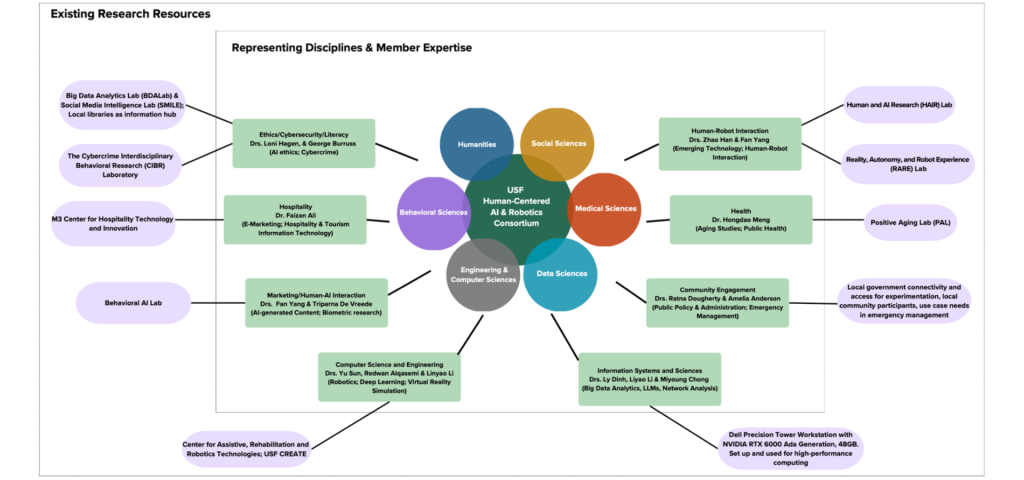About USF Human-Centered AI and Robotics Consortium (USF HARC)
Where We Are: At the Frontier of AI and Robotics Research
Artificial intelligence (AI) and robotics are driving unprecedented opportunities for societal impact, with major U.S. funding agencies establishing dedicated research programs across NSF, NIH, NIA, NEH, and DARPA. This emphasis is further supported by the new executive administration, who signed an Executive Order in early January to encourage and engage in funding and activities that will propel the U.S. as a leader in AI and robotics fields. AAU institutions have made strategic investments in AI and robotics research through more than 6 dedicated schools and over 125 research centers, and our Human-Centered AI and Robotics Consortium (USF-HARC) is poised to bring USF to that table.
Who We Are: The USF Human-Centered AI and Robotics Consortium (USF-HARC)
Aligning with USF’s significant institutional commitments (i.e., the new AI college, AI+X Institute), the USF-HARC is an interdisciplinary, faculty-led collaborative, currently comprising 13 faculty members from 8 units. The consortium distinctively focuses on the human and social dimensions of AI and robotics development. Our mission is to understand and enhance how these technologies can serve human needs, promote social good, and strengthen community well-being to complement USF’s existing technical and infrastructural strengths in AI and robotics.
With Multi-User Research Capital Investment Award (MuRCIA) support to acquire essential shared AI/robotics infrastructure (e.g., humanoid robots, AI-powered research software, and high-performance computing resources – see Budget Narrative), our members can collectively pursue large-scale external funding opportunities. The consortium aspires to serve as an intellectual hub for human- and community-oriented AI and robotics in the greater Tampa Bay Area, bringing together researchers from behavioral sciences, social sciences, data science, medical sciences, computer science, engineering, humanities, and public health to exchange technical and intellectual resources and advance innovative research and education in human-centered AI and robotics.

As visualized above, the faculty-led consortium enables strategic sharing of members’ existing and MuRCIA-funded AI/robotics resources, including 8 research labs and 2 research centers across three USF campuses, facilitating rapid formation of interdisciplinary teams for time-sensitive opportunities. It fosters flexible partnerships with academic, industry, and communities, and create a vibrant intellectual sphere for continuous collaboration and grad-student-/post-doc-training via regular workshops, seminars and distinguished speaker series.
With the MuRCIA fund, the USF-HARC will create powerful synergies with complementary expertise and resources, allowing AI & robotics research across the full spectrum from technical innovation to real-world societal impact. Computer science and engineering (Drs. Sun, Han, Li) drive AI/robotics innovation while information systems and sciences (Drs. Li, Dinh & Chong) and hospitality (Dr. Ali) enable sophisticated data analytics and innovation diffusion. This is expanded by expertise in human-AI/robot interaction (Drs. Yang, Han & De Vreede), ethics/cybersecurity (Drs. Hagen & Burrus), health applications (Dr. Meng), and community engagement (Drs. Dougherty and Anderson) as it relates to public policy, enabling the consortium to transform technical innovations into broader social impacts through an integrated approach impossible in siloed research.
Moving forward, the consortium will accept new members with shared commitment to human-centered AI/robotics and complementary expertise/resources to further strengthen our interdisciplinary capabilities.